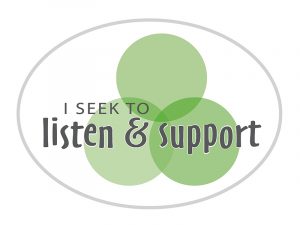
Even though we always aim to offer support, it’s often the case that we aren’t sure exactly what to say when presented with the challenges of others. We want to console and relieve but may feel like we don’t have the information or resources to do so. Or that there isn’t an easy way to connect the providers and receivers of that support.
So in an effort to provide more accessible, dependable spaces for those in need, the Safe Person Decal was created, in partnership with WISE, so that all individuals or groups willing to offer support could better access those seeking it. By publicly displaying the Safe Person Decal, the user actively narrows the gap between the giving and receiving of support through the 7 promises, which are listed below. These guidelines help to ensure that the interaction will be positive for both sides. A short video of local teens portraying the 7 promises can also be found
here.
1. Acknowledge that reaching out for support is a strength.
Welcome the person by recognizing the strength it takes to speak up. They may feel nervous or unsure, so reassure them that this is a positive step. Express your own gratitude for their trust in you as someone who can offer support.
2. Listen and react non-judgmentally.
Listen without bias by recognizing that the person’s feelings are legitimate, even if you’re struggling to understand their perspective. Give their vulnerability your full attention and care in culturally appropriate ways.
3. Respond in a calm and reassuring manner.
You may have an emotional reaction to what you’re hearing. Remind yourself that your feelings can be addressed afterwards. Wait until the person is done speaking before you respond. When you do, offer realistic reassurance. Exhibit acceptance, empathy, and respect.
4. Reflect back the feelings, strengths, ideas I hear when listening.
Repeat or rephrase what you heard in order to check for understanding. Call attention to concrete examples of their resilience and strength. Listen for action they believe would be helpful and are ready to take.
5. Ask how I can be helpful and respond as I’m able.
Ask how you can help. If the person asks for your input, make suitable suggestions. Follow through if they accept your offer. If you aren’t able to help in a way they propose, let them know, and work together to find a compromise.
6. Do what I can to connect to other supports if asked.
Ask if the person would like to hear about other supports before you offer. If they accept, connect them to outside resources that may offer further assistance.
7. Maintain confidentiality and communicate if exceptions exist.
As a rule, maintain confidentiality. If you feel you’re the sole source of the person’s support, ask if there is someone you could engage in supporting them as a team. Inform them that, while you respect their rights, their safety is your top priority, and you will take action to ensure it if necessary. If your professional ethics require you to take such steps, inform them early in the conversation.
The Safe Person Decal is a great way to show your support for those facing mental health challenges. By committing to foster compassionate relationships in safe environments, you can help achieve WISE’s mission. To download decal art or order buttons or decals, please visit
here. And don’t forget to check in next month for our latest post, sign up for the WISE newsletter below, attend a WISE meeting to get more involved, or visit our website at
https://eliminatestigma.org.
Thanks,
The WISE team
 Even though we always aim to offer support, it’s often the case that we aren’t sure exactly what to say when presented with the challenges of others. We want to console and relieve but may feel like we don’t have the information or resources to do so. Or that there isn’t an easy way to connect the providers and receivers of that support.
So in an effort to provide more accessible, dependable spaces for those in need, the Safe Person Decal was created, in partnership with WISE, so that all individuals or groups willing to offer support could better access those seeking it. By publicly displaying the Safe Person Decal, the user actively narrows the gap between the giving and receiving of support through the 7 promises, which are listed below. These guidelines help to ensure that the interaction will be positive for both sides. A short video of local teens portraying the 7 promises can also be found here.
Even though we always aim to offer support, it’s often the case that we aren’t sure exactly what to say when presented with the challenges of others. We want to console and relieve but may feel like we don’t have the information or resources to do so. Or that there isn’t an easy way to connect the providers and receivers of that support.
So in an effort to provide more accessible, dependable spaces for those in need, the Safe Person Decal was created, in partnership with WISE, so that all individuals or groups willing to offer support could better access those seeking it. By publicly displaying the Safe Person Decal, the user actively narrows the gap between the giving and receiving of support through the 7 promises, which are listed below. These guidelines help to ensure that the interaction will be positive for both sides. A short video of local teens portraying the 7 promises can also be found here.